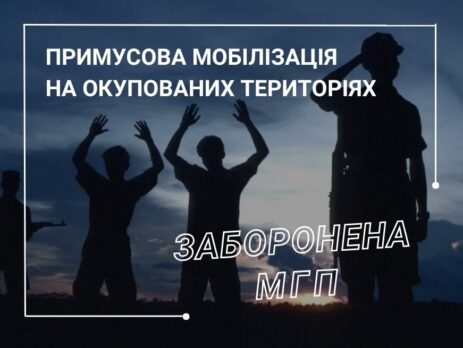Forced mobilisation of residents in the occupied territories is a violation of international humanitarian law
The temporarily occupied territories are part of Ukraine’s internationally recognised territory but are not under the de facto control of Ukrainian authorities due to Russia’s occupation during the ongoing Russian-Ukrainian war. This is the status that some Ukrainian territories received as a result of Russia’s armed attack, first in 2014 and then during the full-scale invasion in 2022. It is important to note that, under international humanitarian law (IHL), a body of law governing armed conflicts, the occupying power is obligated to uphold fundamental human rights in the occupied territories.
However, the Russian occupying authorities are flagrantly violating this obligation, along with numerous other provisions of IHL, including the prohibition of the forced conscription of Ukrainian citizens into the Russian military. Reports are increasingly emerging in the media, indicating that this practice is widespread. Therefore, both Ukrainian citizens and the international community must be aware of the specific provisions of international humanitarian law and the articles of the Rome Statute of the International Criminal Court, which explicitly prohibit forced mobilisation in occupied territories and categorise such actions as war crimes.
Forced Conscription and the Legal Status of the Occupied Territories
International humanitarian law is rooted in the Geneva Conventions (1949) concerning the protection of war victims and their Additional Protocols. In particular, Article 47 of the Fourth Geneva Convention relative to the Protection of Civilian Persons in Time of War states:
Protected persons who are in occupied territory shall not be deprived, in any case or in any manner whatsoever, of the benefits of the present Convention by any change introduced, as the result of the occupation of a territory, into the institutions or government of the said territory, nor by any agreement concluded between the authorities of the occupied territories and the Occupying Power, nor by any annexation by the latter of the whole or part of the occupied territory.
Moreover, the forced mobilisation of citizens in occupied territories is prohibited by Article 51 of the Fourth Geneva Convention:
The Occupying Power may not compel protected persons to serve in its armed or auxiliary forces. No pressure or propaganda which aims at securing voluntary enlistment is permitted.
The Occupying Power may not compel protected persons to work unless they are over eighteen years of age, and then only on work which is necessary either for the needs of the army of occupation, or for the public utility services, or for the feeding, sheltering, clothing, transportation or health of the population of the occupied country. Protected persons may not be compelled to undertake any work which would involve them in the obligation of taking part in military operations. The Occupying Power may not compel protected persons to employ forcible means to ensure the security of the installations where they are performing compulsory labour.
Thus, the forced conscription of residents in occupied territories constitutes a serious violation of international humanitarian law.
Article 8 of the Rome Statute of the International Criminal Court defines the forced mobilisation of citizens in the occupied territories as a war crime:
(v) Compelling a prisoner of war or other protected person to serve in the forces of a hostile Power;
(xv) Compelling the nationals of the hostile party to take part in the operations of war directed against their own country, even if they were in the belligerent’s service before the commencement of the war.
The National Information Bureau of Ukraine has developed a series of recommendations in the event that you or a close relative is forcibly mobilised in occupied territory:
- Report cases of forced mobilisation to the National Information Bureau and law enforcement agencies.
- To notify the authorities about the forced mobilisation of individuals, provide the following information: full name, date of birth, contact details, residential address (or registration address), and the last known location from which the person was forcibly mobilised. Please also specify the last time you had contact with your loved one and the method of communication used. If possible, mention if anyone else saw or communicated with the person before their forced mobilisation.
- If you have a photograph of the individual or any photo/video evidence of the forced mobilisation, immediately inform the National Information Bureau via email at nib.uncp.info@gmail.com or by other means of communication, details of which are available on the website: https://nib.gov.ua.
The dissemination of knowledge about international humanitarian law is one of the statutory activities of the Ukrainian Red Cross. Follow our updates for timely and reliable information.

